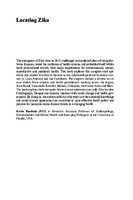Locating Zika
Social Change and Governance in an Ahe of Mosquito Pandemics
| dc.contributor.author | Socorro Veloso de Albuquerque, Maria do | |
| dc.contributor.author | Valongueiro Alves, Sandra | |
| dc.contributor.author | Velho Barreto de Araújo, Thália | |
| dc.contributor.author | Bardosh, Kevin | |
| dc.contributor.author | Bennett, Priscilla | |
| dc.contributor.author | Borbor-Cordova, Mercy J. | |
| dc.contributor.author | Briceño-León, Roberto | |
| dc.contributor.author | Fuentes-Vallejo, Mauricio | |
| dc.contributor.author | Fujii, Yui | |
| dc.contributor.author | García-Betancourt, Tatiana | |
| dc.contributor.author | Gómez-Dantés, Héctor | |
| dc.contributor.author | González-Uribe, Catalina | |
| dc.contributor.author | Guevara, Milady | |
| dc.contributor.author | Henderson, Rebecca Rose | |
| dc.contributor.author | Heydari, Naveed | |
| dc.contributor.author | Maciel Lyra, Tereza | |
| dc.contributor.author | Manrique-Saide, Pablo | |
| dc.contributor.author | Corrêa Matta, Gustavo | |
| dc.contributor.author | Lopes de Melo, Ana Paula | |
| dc.contributor.author | Silva, Lenir da | |
| dc.contributor.author | Nascimento, | |
| dc.contributor.author | Oliveira Nogueira, Carolina de | |
| dc.contributor.author | Pavía-Ruz, Norma | |
| dc.contributor.author | Pimentel, Camila | |
| dc.contributor.author | Quintero, Juliana | |
| dc.date.accessioned | 2019-12-18 15:25:46 | |
| dc.date.accessioned | 2020-04-01T09:18:35Z | |
| dc.date.available | 2020-04-01T09:18:35Z | |
| dc.date.issued | 2019 | |
| dc.identifier | 1006638 | |
| dc.identifier | OCN: 1135853725 | en_US |
| dc.identifier.uri | http://library.oapen.org/handle/20.500.12657/23511 | |
| dc.description.abstract | The emergence of Zika virus challenged conventional ideas of mosquito-borne diseases, tested the resilience of health systems and embedded itself within local sociocultural worlds, with major implications for environmental, sexual, reproductive and paediatric health. This book explores this complex viral epidemic and situates it within its broader social, epidemiological and historical context in Latin America and the Caribbean. The chapters include a diverse set of case studies from scholars and health practitioners working across the region, from Brazil, Venezuela, Ecuador, Mexico, Colombia, the United States and Haiti. The book explores how mosquito-borne disease epidemics (not only Zika but also chikungunya, dengue and malaria) intersect with social change and health governance. By doing so, the authors reflect on the ways in which situated knowledge and social science approaches can contribute to more effective health. | |
| dc.language | English | |
| dc.relation.ispartofseries | Routledge Studies in Health and Medical Anthropology | |
| dc.subject.classification | thema EDItEUR::J Society and Social Sciences::JH Sociology and anthropology::JHM Anthropology | en_US |
| dc.subject.other | Zika virus | |
| dc.subject.other | infection | |
| dc.subject.other | epidemiology | |
| dc.subject.other | Latin America | |
| dc.title | Locating Zika | |
| dc.title.alternative | Social Change and Governance in an Ahe of Mosquito Pandemics | |
| dc.type | book | |
| oapen.identifier.doi | 10.4324/9780429456558 | |
| oapen.relation.isPublishedBy | 7b3c7b10-5b1e-40b3-860e-c6dd5197f0bb | |
| oapen.relation.isbn | 9780429456558 | |
| oapen.imprint | Routledge | |
| oapen.pages | 238 | |
| oapen.notes | 2019-12-18 15:07:41, Funding project name: University of Florida | |
| oapen.identifier.ocn | 1135853725 |

